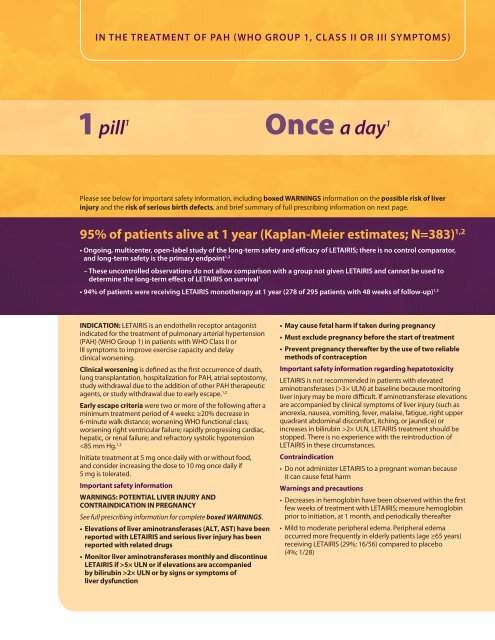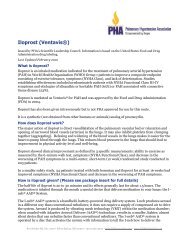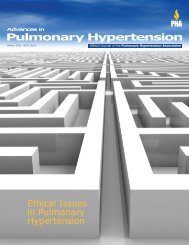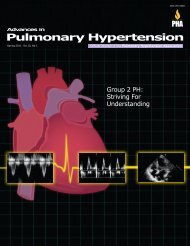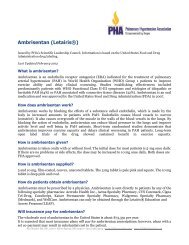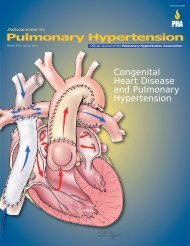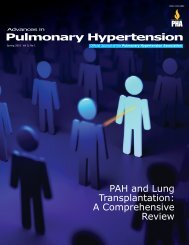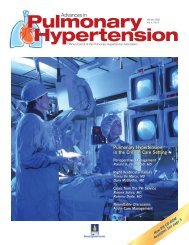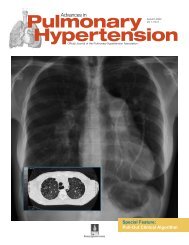Pulmonary Hypertension - PHA Online University
Pulmonary Hypertension - PHA Online University
Pulmonary Hypertension - PHA Online University
Create successful ePaper yourself
Turn your PDF publications into a flip-book with our unique Google optimized e-Paper software.
IN THE TREATMENT OF PAH (WHO GROUP 1, CLASS II OR III SYMPTOMS)1 pill 1Once a day 1Please see below for important safety information, including boxed WARNINGS information on the possible risk of liverinjury and the risk of serious birth defects, and brief summary of full prescribing information on next page.95% of patients alive at 1 year (Kaplan-Meier estimates; N=383) 1,2• Ongoing, multicenter, open-label study of the long-term safety and efficacy of LETAIRIS; there is no control comparator,and long-term safety is the primary endpoint 1,2– These uncontrolled observations do not allow comparison with a group not given LETAIRIS and cannot be used todetermine the long-term effect of LETAIRIS on survival 1• 94% of patients were receiving LETAIRIS monotherapy at 1 year (278 of 295 patients with 48 weeks of follow-up) 1,2INDICATION: LETAIRIS is an endothelin receptor antagonistindicated for the treatment of pulmonary arterial hypertension(PAH) (WHO Group 1) in patients with WHO Class II orIII symptoms to improve exercise capacity and delayclinical worsening.Clinical worsening is defined as the first occurrence of death,lung transplantation, hospitalization for PAH, atrial septostomy,study withdrawal due to the addition of other PAH therapeuticagents, or study withdrawal due to early escape. 1,2Early escape criteria were two or more of the following after aminimum treatment period of 4 weeks: ≥20% decrease in6-minute walk distance; worsening WHO functional class;worsening right ventricular failure; rapidly progressing cardiac,hepatic, or renal failure; and refractory systolic hypotension5× ULN or if elevations are accompaniedby bilirubin >2× ULN or by signs or symptoms ofliver dysfunction• May cause fetal harm if taken during pregnancy• Must exclude pregnancy before the start of treatment• Prevent pregnancy thereafter by the use of two reliablemethods of contraceptionImportant safety information regarding hepatotoxicityLETAIRIS is not recommended in patients with elevatedaminotransferases (>3× ULN) at baseline because monitoringliver injury may be more difficult. If aminotransferase elevationsare accompanied by clinical symptoms of liver injury (such asanorexia, nausea, vomiting, fever, malaise, fatigue, right upperquadrant abdominal discomfort, itching, or jaundice) orincreases in bilirubin >2× ULN, LETAIRIS treatment should bestopped. There is no experience with the reintroduction ofLETAIRIS in these circumstances.Contraindication• Do not administer LETAIRIS to a pregnant woman becauseit can cause fetal harmWarnings and precautions• Decreases in hemoglobin have been observed within the firstfew weeks of treatment with LETAIRIS; measure hemoglobinprior to initiation, at 1 month, and periodically thereafter• Mild to moderate peripheral edema. Peripheral edemaoccurred more frequently in elderly patients (age ≥65 years)receiving LETAIRIS (29%; 16/56) compared to placebo(4%; 1/28)


